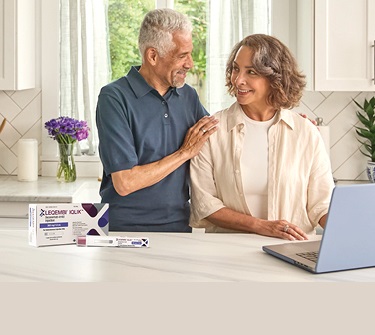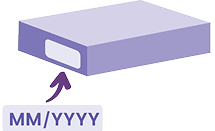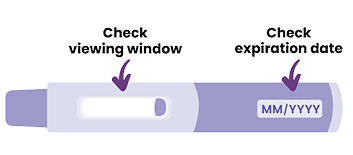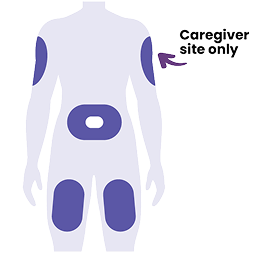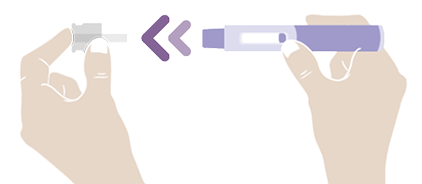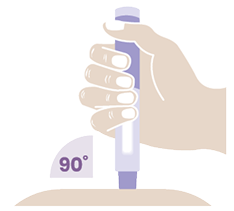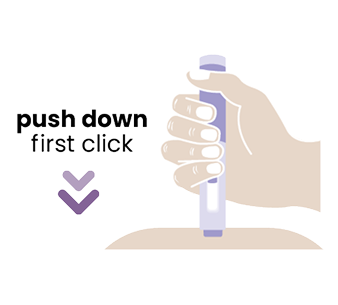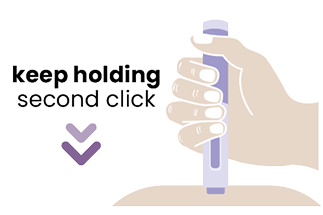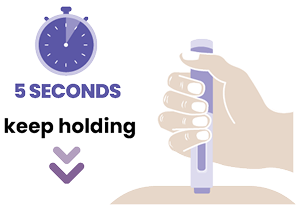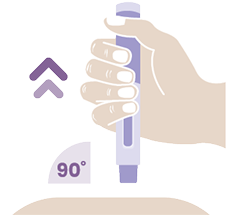How to use LEQEMBI IQLIK
This video will teach you how to use LEQEMBI IQLIK. This once-weekly, at-home maintenance treatment is an available option to patients after 18 months of LEQEMBI infusions. LEQEMBI is a prescription medicine used to treat people with Alzheimer’s disease, which includes mild cognitive impairment (MCI) or mild dementia stage of disease. Before you start using LEQEMBI IQLIK, read the Instructions for Use and the Medication Guide that you received with your autoinjector. You should also read them each time you refill because there may be new information. This information does not take the place of talking to your health care provider about your medical condition or your treatment. If you have any questions about how to use the autoinjector, contact your health care provider. Meet Sophia. She'll be demonstrating the injection process. This is Sophia's husband, Rick. He's here to help. Place your supplies on a clean, flat surface. You’ll need: The LEQEMBI IQLIK autoinjector, cotton ball or gauze, an adhesive bandage, an alcohol wipe and a sharps disposal container. Your LEQEMBI IQLIK arrives in a refrigerated carton. When you are ready to inject, take one out and let it sit at room temperature for 20 minutes. Check the carton and autoinjector for damage or broken seals. Do not use if the expiration date on the carton has passed, or if the perforations on the carton are broken. Check the viewing window: Do not use the autoinjector if it has been damaged or dropped, looks cloudy, discolored, or contains particles. The liquid should be clear and colorless to pale yellow. Air bubbles are normal. Do not use if the expiration date has passed. Once at room temperature, it can stay out for up to 14 days, but don't put it back in the fridge. Use one injector weekly, as directed. Before you inject, Wash your hands with soap and water or use hand sanitizer. Do not inject through clothing. You can inject into the front of the thighs or stomach area. If a care partner helps, they can also inject in the back of the upper arms. Do not inject into moles, scars, bruises, tattoos, or red or injured skin. Do not inject into the 2-inch area around your belly button or through clothing. Pick your site at least one inch away from your last injection. Clean with an alcohol wipe and let it air dry. Don't touch, fan, or blow after it's been cleaned. Remove the clear cap by pulling it straight off; don't twist or bend. Throw the cup away in your trash or sharps container. Place the magenta needle cover flat against the skin at a 90-degree angle. Push down firmly to start the injection. Hold steady. You may hear a click, which means the injection has started. The purple plunger rod will move down in the viewing window during the injection. If you have trouble hearing the click, watch the purple plunger rod as it moves down. Hold for about 10 seconds. You'll then hear a second click, which means the injection is complete. Keep holding for 5 more seconds. Pull the autoinjector straight up. The magenta needle cover will automatically move into place to cover the needle. You may notice a small drop of blood. This is normal. Press a cotton ball or gauze on the area, and cover with a bandage, if needed. Do not rub the injection site. Throw away the used injector into a sharps container. If you don’t have an FDA-cleared sharps container, use a heavy duty plastic container with a tight- fitting, puncture-resistant lid. Label it clearly. When it's almost full, follow local guidelines to dispose of it properly. That's it. We've covered how to gather your supplies, and prepare, inject, and dispose of LEQEMBI IQLIK. You can watch this video again anytime. If you have questions, reach out to your healthcare provider. Scan the QR code to download a wallet card that informs your healthcare provider you are taking LEQEMBI IQLIK. What is LEQEMBI? LEQEMBI is a prescription medicine used to treat people with early Alzheimer's disease, which includes mild cognitive impairment (MCI) or mild dementia stage of disease. IMPORTANT SAFETY INFORMATION What is the most important information I should know about LEQEMBI? LEQEMBI can cause serious side effects, including: ARIA (Amyloid-Related Imaging Abnormalities). ARIA is a side effect that does not usually cause any symptoms, but serious symptoms can occur. ARIA can be fatal. ARIA commonly shows up as temporary swelling in areas of the brain that usually goes away over time. Small spots of bleeding in or on the surface of the brain can occur. Less often, larger areas of bleeding in the brain can occur. Most people with ARIA don't have any symptoms. However, some people may notice: headache, confusion that gets worse, dizziness, vision changes, nausea, difficulty walking, seizures, difficulty speaking, or muscle weakness. Some people have a gene called ApoE4 that may increase the risk of ARIA. Talk to your health care provider about testing to see if you have this gene. You may be at a higher risk of developing bleeding in the brain if you take medicines to reduce blood clots from forming (antithrombotic medicines) while receiving LEQEMBI. Talk to your healthcare provider to see if any of the medicines you're taking increase this risk. Your health care provider will check for ARIA with MRI (magnetic resonance imaging) scans before you start LEQEMBI and during treatment. You should carry information that says you are receiving LEQEMBI, which can cause ARIA, and that ARIA symptoms can look like stroke symptoms. Call your healthcare provider or go to the nearest hospital emergency room right away if you have any of the symptoms mentioned previously. Serious allergic reactions: Do not receive LEQEMBI if you have serious allergic reactions to LEQEMBI, LEQEMBI IQLIK, or any of the ingredients. Tell your healthcare provider if you notice any symptoms during or after a LEQEMBI infusion, including: swelling of the face, lips, mouth, or tongue. Itchy bumps on the skin also known as hives, and difficulty breathing. Infusion-related reactions: Infusion-related reactions can occur during or after completion with LEQEMBI injection into a vein (intravenously), which can be serious. Tell your healthcare provider right away if you notice any of these symptoms: Fever, flu-like symptoms (chills, body aches, feeling shaky, joint pain), nausea and/or vomiting, dizziness or lightheadedness, fast or slow heart rate, or feeling like your chest is pounding, difficulty breathing or shortness of breath, and changes in blood pressure. If you have an infusion-related reaction, your healthcare provider may give you medicines before your next infusion to lower the chance of having a reaction. Injection-related reactions: Injection-related reactions may occur with LEQEMBI injection under the skin (subcutaneous injection with LEQEMBI IQLIK). Tell your healthcare provider if you notice any of these symptoms during or after an injection: Redness, swelling, heat, pain, itching, rash, bruising and blood collection under the skin at the injection site. Headache, fatigue, or fever may also be observed after an injection. The most common side effects of LEQEMBI include infusion- related reactions, ARIA, and headaches. These are not all the possible side effects of LEQEMBI. Call your doctor for more information and medical advice about side effects. You may report side effects to the FDA at www.fda.gov/medwatch or call 1-800-FDA-1088. Before receiving LEQEMBI, tell your healthcare provider about: All your medical conditions, including if you are pregnant, breastfeeding, or plan to become pregnant or breastfeed. It is not known if LEQEMBI could harm your unborn or breastfeeding baby. All the medicines you take, including prescription and over-the-counter medicines, vitamins, and herbal supplements. Especially tell your healthcare provider if you take medicines to reduce blood clots from forming (antithrombotic medicines, including aspirin). LEQEMBI (lecanemab-irmb) is available as: Intravenous infusion: 100mg/ml and Subcutaneous injection: 200mg/ml. Please see Medication Guide with Instructions for Use and the full Prescribing Information, including Boxed WARNING, on LEQEMBI.com.
Get familiar with the
LEQEMBI IQLIK autoinjector
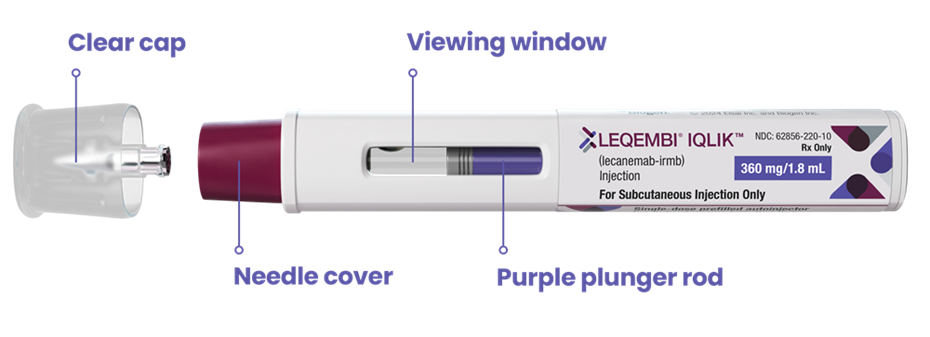
Be sure to review these steps to inject
GATHER SUPPLIES
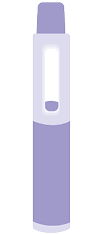
autoinjector

wipe

or gauze

bandage

container
IN CARTON
PREPARING TO INJECT LEQEMBI IQLIK
Check the carton.
•
Do not use if the expiration date on the carton has
passed.
•
Do not use if the perforations on the carton are
broken.
Wash your hands with soap and water or use hand sanitizer.
INJECTING LEQEMBI IQLIK
Clean the injection site with an alcohol wipe and allow the skin to air dry.
• Do not touch the injection site after it is cleaned.
• Do not fan or blow on the cleaned area.
Throw away (dispose of) the cap in the household trash or sharps disposal container.
You may notice a small drop of blood at the injection site. This is normal. Press a cotton ball or gauze on the area.
• If needed, cover the injection site with an adhesive bandage.
• Do not rub the injection site.
Throw away (dispose of) the autoinjector in an FDA-cleared sharps disposal container.
DISPOSING OF LEQEMBI IQLIK
Do not throw away (dispose of) the autoinjector in the household trash.
If you do not have an FDA-cleared sharps disposal container, you may use a household container that is:
• made of heavy-duty plastic;
•
can be closed with a tight-fitting, puncture-resistant lid, without sharps being able to
come out;
• upright and stable during use;
• leak-resistant; and
• properly labeled to warn of hazardous waste inside the container
When your sharps disposal container is almost full, follow
your community guidelines for the right way to throw away
(dispose of) your sharps container. There may be state or
local laws about how you should throw away used needles
and syringes. For more information about safe sharps
disposal, and for specific information about sharps disposal
in the state that you live in, go to the FDA’s website at:
http://www.fda.gov/safesharpsdisposal.
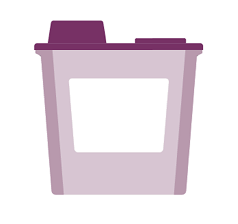
Do not dispose of your used sharps disposal container in
your household trash unless your community guidelines
permit this.
Do not recycle your used sharps disposal container.
Support for staying on
track
It’s important to follow each part of your treatment plan. That includes
sticking to your schedule and tracking where you inject.

Enroll in the LEQEMBI Companion™ program for one-on-one injection support with a Nurse Educator* to help you get comfortable with injecting either in person or virtually. They cannot, however, provide medical advice.
Designed to help you track when and where you inject to help make sure you do not miss a dose.
*Nurse Educators are provided by Eisai and Biogen (manufacturers of LEQEMBI) and do not work under the direction of your healthcare provider.




